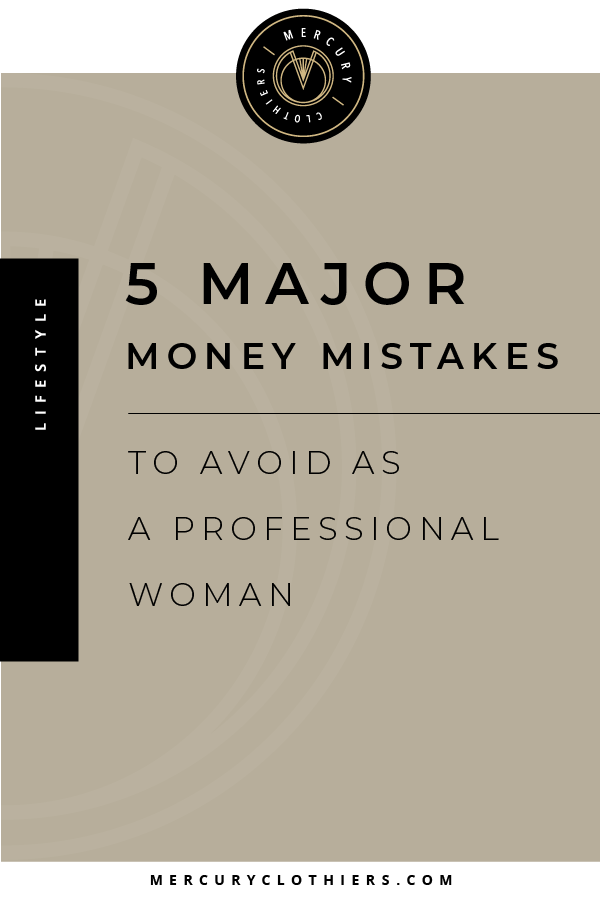
Personal Finance Tips: 5 Major Money Mistakes to Avoid as a Professional Woman
5 Personal Finance Tips For Savvy Career Women
Personal Finance Tips for Working Women
*Disclaimer: This post is for informational purposes only. We do not guarantee that you will become debt-free by following our money management tips. Please speak to a financial advisor for specific guidance.
As career women, our minds are focused on advancing our professional lives while delicately balancing our personal lives. So, where does that leave our financial lives?
We will tell you what you need to do (and not do) to manage and control your money. Should you spend it? Save it? And what on? We have 5 personal finance tips to help you get your finances in order and avoid big mistakes.
Managing your finances properly is actually good for your mental health which is why we included it as one of our 9 self care tips for summer.
Personal Finance Tip #1: Budget
The first thing every professional woman needs is a budget! Not having one is a mistake.
The trouble is creating one and sticking to it. Many people acknowledge they need a budget but will not take the time to create one or stick to its parameters. Why? Because budgeting has a bad connotation of being tedious, time consuming and hard to maintain, logically making it a complete waste of time.
We are advocates of budgets, along with every financial advisor you meet.
A budget is just a plan. A plan for you to keep track of how you spend your money. And the beautiful thing is — you create it! It can be a simple excel spreadsheet that you update daily or a google doc which you can share live updates with your husband and other adults in the household.
There are also budgetary apps like this one which make it very easy for you to create a budget and control how you spend money.
Not knowing where your money is going is a mistake and fortunately, very avoidable.
Find more budgetary advice here.
Personal Finance Tip #2: Savings
Not saving any money is another financial mistake that professional women make. Once the bills are paid and there is food in the house, our minds somehow default to thinking the rest of the money is for fun. Wrong.
You need to be saving. In fact, you need to have multiple savings accounts for investments, emergencies and true savings. Some financial advisors recommend saving 3-6 months worth of expenses as an emergency fund. Beyond that, you have the kids’ cars and college tuitions to think about.
Knowing how much of your income to save and where to save it is personal finance tip number two.
Have you read our blog post — Money Management Tips: When to Save & When to Spend?
Personal Finance Tip #3: Retirement
Not having a retirement plan is mistake number three. If your employer offers a retirement plan, great. If they match your contributions, even better. Use that to your advantage!
You need to have a retirement plan. Not only for your sanity so that you can stop working at some point in your life, but for your children’s sanity as well. You do not want to become a financial responsibility to your kids.
If you have been inattentive to your financial future and have not started planning for your retirement, start now. Contrary to what you might think, it is not too late to start.
Personal Finance Tip #4: Debt
Mistake number four that professional women make is not caring enough about debt. The car, the house, credit cards, lines of credit, loans, etc. — it is all debt and all needs to be paid off (sooner rather than later).
We understand the mindset that many professional women slip into. You have a lot going on in your life and although you know finances are important, debt is an obligation that is simply put on the backburner.
It is completely normal to finance big purchases and lose track of them. We recommend you take time to put together a spreadsheet and understand just how many things you have financed and ultimately how much you owe.
On the contrary to accepting debt as a normal way of life, financial advisors like Dave Ramsey will tell you not to finance or at the very least, save a chunk of money for the down payment to avoid owing money at all.
We believe that money is not everything but you certainly need to be in control of it.
Personal Finance Tip #5: Goals
As you are following steps one through four, it is extremely important to set appropriate goals — goals that are attainable and not miserable.
As a goal-driven individual, this isn’t new information. There is nothing worse for your self esteem than making goals you honestly cannot reach or restrictions you cannot abide by.
We give you major points for being ambitious but you need to be realistic. The point is to be in control of your lifestyle.
For example, if your goal is to reconcile some debt, give yourself appropriate time to do it. Whether you survive on rice and beans for a year or pay it off over three years, either is great. Just set your expectations at the beginning.
Related blog posts:
How to Manage Money | Tips for Working Women
Money Management Tips: When to Save & When to Spend



Comments